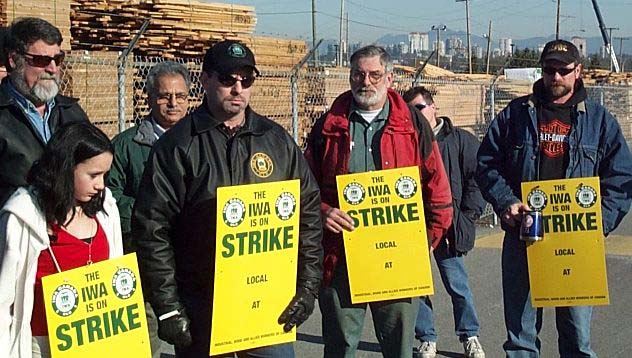
The labour movement in British Columbia is in big trouble.
There’s a war going on within the BC Federation of Labour which pits the once-proud International Woodworkers of America — led for 16 years by Jack Munro, at a time before the softwood lumber dispute, when the IWA was a major player in a burgeoning, $2.5 billion Canadian forest industry — and the house of labour, not just in British Columbia but across Canada.
The crux of the dispute lies both within the union — the internecine war that has been going on for months, illustrated in this story (see ‘A New Low for IWA Canada’, January 29) — and without.
“The Canadian Labour Congress has imposed sanctions on the Industrial, Wood and Allied Workers of Canada, after one of its locals signed a deal with a private contractor in defiance of a CLC motion calling on the union to ‘cease and desist from further voluntary agreements related to Bill 29 in British Columbia.”
A joint Canadian Union of Public Employees / Hospital Employees Union bulletin, published on January 6th, provides further background.
“In January 2002, the Gordon Campbell government introduced Bill 29 which removed health care workers’ successor rights, their collective agreement’s prohibitions against contracting out, as well as severely limiting employee layoff bumping rights.
Their actions paved the way to contract out major portions of BC’s health care support staff work — work performed by CUPE/HEU members. The BC labour movement and the CLC anticipated plans by multinational corporations to approach unions to sign voluntary recognition agreements through which significant wage/benefit concessions would be imposed.
Both the BC Federation of Labour and the CLC adopted policies to dissuade affiliate unions from entering into such voluntary agreements which would undermine existing health care unions’ efforts to follow their work (even if it was contracted out).
By early 2003 it was clear that the IWA-Canada had signed voluntary (or so-called ‘Partnership’) agreements with at least three multinational corporations — Compass from the UK, Sodexho from France and Aramark from the U.S.”
The United Food and Commercial Workers Union suggests that “the Canadian labour movement is falling apart one brick at a time and the IWA’s exploitation of workers — along with its corporate partners — is just one example of the race for the bottom of the barrel of union representation.”
For VanRamblings, the bottom line is this: the IWA has become a ‘business union’, losing any sense of who the ‘enemy’ is (right-wing governments intent on eroding workers’ rights). While workers’ unions in Canada must be united in their struggle to re-establish social justice — where setbacks have been many in recent years as reactionary governments have sought to destroy workers’ rights, by enacting legislation just short of ‘right to work’, in provinces across Canada; gain fair wage compensation and benefit packages for their members; and work together with like-minded interest groups (e.g. environmentalists, students), across Canada, to defeat the damnable corporate interests who would turn the clock back a century and more — instead the labour movement finds itself at war with itself.
These are troubling days for many, many reasons — covered and commented upon often in VanRamblings. If we are to succeed in building a better world for all of us, not just the privileged few, disputes such as the one the CLC is currently experiencing with a rogue-like IWA must be resolved, expeditiously and in the better interests of the greater society.